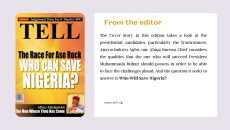Kehinde Bademosi, founder of the Orange Academy, has inspired this piece. The brand expert disclosed that he has been living with the ‘damn’ HIV virus for 15 years. His story appeared in a post on Facebook to mark World AIDS Day on December 1, 2014. Kenny’s story was the most re-tweeted and re-blogged story of that day as it caught the imagination of bloggers and readers alike.
Bademosi did what most Nigerians would never do: own to a disease. Recently, the Nobel laureate, Professor Wole Soyinka, also disclosed that he had been fighting prostate cancer. Let us just say these are rare individuals. As a nation, we find it hard to disclose our ailments or diseases. The social culture is to keep it secret. HIV is hard to own as there is a stigma attached to it. It is the same reason men and women have sex with new partners without asking or investigating their sexual history. It also explains why sex without condoms is still prevalent in the African community here in the United Kingdom, UK. We don’t like talking about sex as we consider it a private issue, yet HIV is on the increase between heterosexual couples.
Our religiosity also prevents us from being honest. We assume that once we give offerings, fast, pray and attend certain churches, our diseases would disappear. It doesn’t work that way. These days, it is ignorance that is killing people, not HIV itself.
Many people talk about the stigma attached to HIV. Can you sit next to them on a bus, can you hug them, touch them and so on? HIV is in the blood. It spreads mainly through unprotected sex. And the stigma is everywhere. Even here in the UK, HIV infected people routinely suffer discrimination from health care professionals, employers and from people generally. Even though HIV is widely spoken about, support groups help people deal with difficulties of living with it.
If Kenny did not write what he wrote, it would not have occurred to me to research the effects of HIV. Nonetheless, we salute Kenny for his bravery and courage to talk about living with HIV. Could it be that the rich and famous are not stigmatised? I wonder. The discrimination HIV sufferers face is the reason they refuse to disclose. Yet, stories of people like Kenny who have had HIV for 15 years and the American Footballer Magic Iohnson who has lived with HIV for over 22 years go to show that you can live a healthy life with HIV. Early detection and use of drugs goes a long way to help the survival of these two men.
Two factors here: they were able to afford their medication, and they had access to the best medical facilities in the world. Kehinde’s essay mentioned talking to his doctor in the United States and his love to travel. One wonders how the ordinary people, particularly in developing countries like Nigeria that are living with the disease, could have coped.
In the UK, certain groups experience a disproportionate burden of HIV: men who have sex with men and black African and Caribbean people. In 2013, an estimated 107,800 people were living with HIV in the UK. In the same year, a total of 81,512 people including 542 children received HIV specialist care. In 2004, 41,157 people had access to care. About two-thirds of people receiving HIV specialist care were male. Data from an online HIV website suggests that 95 per cent of people living with the virus in the UK would have acquired that status through sex without a condom.
People living with HIV who were exposed to heterosexual sex were by far the largest group. Over half the people receiving HIV specialist care were white and over a third were black African (53 per cent white and 33 per cent black African). It is interesting to note that due to a combination of ongoing transmission and increased survival, this has led to a large increase in the number of people over 50 who are accessing HIV care. Since 2008, these drugs add an additional 16 years to the lifespan of an HIV sufferer. The data also indicated that HIV sufferers are living as long as normal people without HIV.
James Gallagher, health editor for the British Broadcasting Corporation, BBC, wrote an article for the BBC News website titled, HIV evolving ‘into milder form’. There he suggests that the findings in ‘Proceedings of the National Academy of Sciences’ also suggested that anti-retroviral drugs were forcing HIV to evolve into milder forms. He showed that the drugs target the nastiest versions of HIV and encourage the milder ones to thrive. One must sound a note of caution here: a watered down version of HIV is still dangerous and could cause AIDS. The good news is that HIV is no longer the killer that we thought it once was. It is taking longer for HIV infection to cause AIDS. But the picture is far from rosy. Thirty-five million people around the world are living with HIV. There were 2.1 million new cases in 2013, which is 38 per cent less than the 3.8 figure in 2001. AIDS-related deaths have fallen by a fifth in the past three years, standing at 1.5 million a year. The battle is not over yet.
What does HIV look like in Nigeria? According to avert.org, Nigeria has the second highest number of new infections reported each year and the second highest number of people living with HIV. An estimated 3.7 to 10 per cent of the populations (depending on your data source) are living with HIV. The three main HIV transmission routes are heterosexual sex (this accounts for 80 per cent of HIV infections), blood transfusions and mother-to-child transmissions. In 2011, women were considered more affected by the epidemic with an estimated 1.7 million people living with the disease.
Very few Nigerians know their HIV status. This can place a person at risk, as they are not able to access timely HIV treatment and care. Groups at risk of HIV infections are sex workers and men who have sex with men. The Nigerian government did well with containing Ebola. The question is, could that be replicated in containing HIV amongst women?
In conclusion, as we approach the end of the year, the best thing we could give ourselves this season is to have an HIV test. Thankfully, up and down Nigeria, there are test centres. Secondly, you can help spread the word: use a condom or two when you do have sex, and if you are not sure of your partner’s sexual history, encourage him or her to test for HIV first before you decide to have sex at all.
Follow Us on Social Media



 WhatsApp us
WhatsApp us